- Home
- David Liss
The Day of Atonement Page 20
The Day of Atonement Read online
Page 20
I had no idea what I should do with this information. Kill Franklin? I had come here to take justice upon an Inquisitor, not to go on a bloody rampage, slitting the throat of any man who had wronged my family. Yet I could not walk away from this either.
One of the Nobreza servants, an elderly woman with a displeasing, crumpled face, opened the door and ushered us inside. I led Luis to the parlor and set him in a chair. As I turned around, Eusebio and Gabriela entered the room.
I had to struggle to keep myself from staring at her. Her white gown clung enticingly to her body, exposing much of her shoulders, and her skin glistened in the dim light. I had tried to prepare for her beauty by reminding myself what she looked like and what effect she had upon me, but all that work was for nothing. Looking upon her face was like a blow, forceful and unexpected. Here was the woman I should have married. In another life, I might have escaped with her when we were young. We might have fled to some tolerant land. We would now have children together, perhaps many, and we would be living in contentment. In that life, I was a different person, a man untroubled by remorse or rage. I was gentle and kind and could love without reservation.
“What is this?” Eusebio demanded, interrupting my reverie. “He is an old man, and you took him out and got him drunk.”
“He got himself drunk,” I said. “I merely encouraged it.”
“I thought better of you, Foxx.”
I attempted to hold myself like a dignified man, though I suspected I was making a poor show of it. My balance was not at its best. Given the right sort of incentive, inebriation could be shrugged off; I knew from experience that if an assailant were to attack, I could recover well enough. Conversation, however, was a bit more challenging.
“Good senhor,” I attempted, “let us not make much of nothing. Your father is not a child. He and I enjoyed good food, drink, and conversation.”
Eusebio shook his head. “I know that in your nation, consuming great quantities of drink is a sign of manhood, so I shall not hold this against you. Not this time. However, if you should abuse my hospitality again, I shall have to rethink our business arrangement.”
I bowed low and long. I did not fall over. Triumph! “I have offended where I did not intend to, and the blunder was one of ignorance, not malice. I have much to learn of your country.”
Eusebio appeared to be considering the merits of this apology. I, meanwhile, was considering slamming Eusebio’s face into the wall.
“Get me a glass of wine,” Luis cried from his near-sleep. “I am thirsty.”
“Bring him water,” Eusebio snapped at his wife. He took one last look at me and Luis, and then left the room.
I now found myself alone with Luis, who had slipped back into a stupor. I kneeled before him and began to remove the older man’s boots. They came off fairly easily, which was something of a relief. I did not know if I was prepared for a complicated operation.
I knew I should leave. Now. Before Gabriela returned. Being alone with her was madness, and I was not in full control.
I stood cautiously, but before I could make my way out of the room, Gabriela entered with a crystal pitcher of water and a goblet upon a pewter platter.
“You are very kind to him,” she said, setting the platter down near her sleeping father-in-law. “I know he enjoys your company.”
“And I his,” I said. I took a step back. The room, which had seemed well lit a moment ago, now appeared too dark for a man and a woman accompanied only by an unconscious old man. “I am sorry to have offended you tonight. I truly meant no harm.”
Gabriela had poured water into the cup and was now bent over Luis, gently tipping it to his lips. I admired her shape under her gown, but I would not let my eyes linger.
“To my mind, it is good that Luis has a companion,” she said. “Like many men his age, he longs to have someone to talk and listen to. But until you have concluded your business with my husband, you should not be too good a friend.” She stood and looked at me. “Eusebio can be guarded about his position.”
She shared confidences with me! More than that, what she told me was at the expense of her husband. This was almost as good as a kiss. “It is hard to live in the shadow of a successful father,” I said. “Your husband wants to be his own man. I understand that.”
“Was your father a great man?” she asked, still serving the water to Luis.
“Oh, yes,” I answered.
Gabriela set down the goblet and studied me, as if trying to puzzle out some mystery, but then seemed to shake away the notion. “I am trusting in your honor, Mr. Foxx. I hope you will be good to my husband. Our luck has not been the best. There have been some missteps, and some debts, and we cannot withstand any more ill turns.”
“I understand,” I said, though I did not. Was she warning me off? She did not recognize me, but could it be she felt some ember of what had been between us?
“I want,” I told her, “only that everyone should benefit.”
Gabriela looked at her father-in-law, slumped in his chair, and now snoring quite loudly. Then she gazed about the room and seemed to notice, for the first time, that she was, for all practical purposes, alone with me in the gloom.
“I must go,” I said.
“Good night, Mr. Foxx.”
“Good night, senhora.”
“Mr. Foxx.”
Grateful for the excuse to look upon her once more, I turned around.
“This is much to ask and I know it is not your religion, but it would look good for us—make a good impression upon those who watch—if you would join us for church this Sunday. To entice an Englishman to come to mass with us would help my husband’s standing. It would also protect us, at least a little. The Inquisition may be less likely to persecute New Christians who stand some chance of bringing Englishmen to the faith.”
There were few things I desired less than to attend a Catholic mass, and I knew that my attendance would not impress Inquisition spies the way Gabriela believed it would. Nevertheless, she thought it would make her safer, so I could not refuse her. I did not want to disappoint her, and I did not want to miss an opportunity to see her again.
I bowed. “I would be honored.”
She smiled. “I do not believe it will put you in additional danger or I would not have suggested it. If you wish, you may meet us there, outside the Igreja de São Domingos. It is upon the Rossio. Do you know it?”
It was the official church of the Inquisition itself, hard by the Palace. It was there that Jews, my ancestors and hers, had been made to kneel and submit to the Catholic faith. “I can find it.”
“We shall see you there. Good night, then.”
I turned away from her again.
The outing had been something of an experiment. It had been my intention to extract information and a promise from Luis, and I had encouraged the old man to drink to that purpose. Unfortunately, our excess had been so great there was a chance he would not remember his promise. But I had seen Gabriela. That had been one achievement.
I made no vows to myself. I resolved to do nothing and to refrain from nothing. I would do my duty and for the rest—well, I would see what my duty allowed.
Chapter 18
Word of newly arrived ships always circulated quickly among the English taverns, so the next morning I was hardly out of bed before learning the vessel upon which the Carvers’ previous investment depended had safely returned. This, I knew, was the moment it would all come together. My line of credit was secure, which meant the Carvers would not only put gold in their vault but would keep it there pending the next major transaction—one in which they hoped to steal everything I had borrowed, ruining both me and Eusebio.
The time for waiting had come to an end. Settwell would have justice and liberty. Those who had stood against me and my family would face their punishment. As for Gabriela—my thoughts on that could wait. I had indulged in too much drink the night before. I was now master of myself, but my head felt slightly heavy and my
thoughts sluggish. It was not the time for considering new courses of action.
I made every effort to hurry out of the inn, having Enéas dress me quickly and gather together my things, but when I reached the bottom of the stairs I found the massive form of Kingsley Franklin blocking my path.
“Mr. Foxx, I’d have a word with you.”
I looked at the man who had betrayed my father. For years I had assumed that if anyone had given my father’s name to the Inquisition it had been out of necessity. I would not blame a man for attempting to survive. Those were the rules of the game. But here was the person whose actions had led to my father’s death, and he had done it out of greed, not pain or fear or desperation.
“I am very busy, sir,” I told Franklin.
“You are not too busy for this conversation.”
“You will find that I am,” I answered, pushing past the large man.
Franklin grabbed my arm. I spun toward him, and the innkeeper took a step back, alarmed like a man who has just stepped upon a snake. He raised his hands to show he meant no harm. “Mr. Foxx, if I have given some offense, then I beg your forgiveness.”
Putting Franklin on his guard would do me no good, and so I forced myself to smile. “Of course not, sir. I’m merely in a hurry. But we shall resolve things soon enough, I promise you.”
I breakfasted with Settwell, who expressed pleasure at the news that all the pieces were in place. After we ate, Settwell brought Mariana down to say hello, and I spent the better part of an hour with the girl, reading poetry to her and then discussing the verse.
“Father does not often have guests,” she told me. “You must be special.”
“I am not special,” I said. “I am, however, an old friend. I have known your father for many years.”
She nodded. “You are both very old.”
“Your father is much older,” I said, laughing. “I am still quite young.”
She studied me for a moment. “Will you be too old to marry me when I am grown up?”
“By no means. I shall happily wait.”
“Then I accept your proposal,” the girl told me with delight. “You shall marry me, and we shall escape Lisbon.”
“Mariana!” Settwell cried out. He had been across the room, reviewing a newspaper, but now he stormed toward the girl, his hand raised.
It was an awkward business to interfere with a parent’s discipline, but I blocked Settwell’s approach with my body. “Did the girl say something wrong?” I knew well what her mistake had been, but I wanted Settwell’s temper to cool.
“I am sorry, Father,” Mariana said. She walked around me and presented herself meekly. “I forgot myself while speaking to Mr. Foxx. I know better.”
Settwell had recovered himself. He knelt before the child and embraced her. “You do know better,” he told her. “I am sorry to have frightened you, but you should be frightened. If the wrong person were to hear you say such a thing, he would take you away from me forever. Do you understand? You and I would never see each other again.”
She clung to him more tightly now. “I forgot myself because Mr. Foxx is so kind, and because you had him in our home.”
Settwell rose, taking the child with him. He set her down in a chair. “I do trust him, but that does not matter. You must be on your guard at all times. You must never say naughty things, even with people who will cause no trouble.”
She nodded and hugged her father again.
Settwell walked over to me. “I am a freeborn Englishman. You cannot know how I hate telling my own child she may not express her thoughts.”
“I understand you,” I said.
“I know you do. For the love of God, Mr. Foxx, you must get me the money I need to escape this wretched country before I lose my daughter.”
To that end, I met with the Carvers that afternoon at the Three Speckled Hens. I shook Rutherford’s hand and bowed to Roberta, and then took a seat after calling for coffee.
“I have great news,” I said, pretending to be ignorant of their own.
“You must be quick to beat the winds of rumor in this city,” said Rutherford with jollity. “It is said that the Jew Nobreza has finally extended you a line of credit.”
I grinned like a boy given a prize. “He has indeed. I find I am ready to commence my career as a Factory man.”
“You’ll not become a Factory man so easily as that,” Rutherford said. “It will take years of dedication and canny choices before you are admitted.”
“But it is a start,” Roberta said, looking about the room—not looking at me. “We must encourage the young man.”
Rutherford slapped the table. “We must indeed. And I do. I do encourage him. Are you encouraged, Mr. Foxx?”
“I believe I am, sir.”
“And Eusebio Nobreza, no less. That man could teach a whole tribe of Hebrews to pinch their pennies. Teach them by example, I tell you. However did you win over the miser?”
I allowed myself to color slightly as I shrugged. “I was not aware that he was any less agreeable than any other man. I merely presented my case to him. He knows I can support his advance with funds at home, and even these Portuguese understand the value of English rents. I admit, I did strike up a friendship with his father, whom I find to be very agreeable.”
“Old Nobreza!” Rutherford cried out. “That scoundrel. Ha-ha! In his youth, they say, he rutted half the Jew bitches in Lisbon. Get at the son through his reprobate father. Clever, sir. Clever.”
“I admit I was not attempting to be clever. Merely to be agreeable.”
“You may confess your secrets to me, sir,” Rutherford said with another slap on the table, “but tell no one else. If anyone inquires, you cleverly sought out a weakness and you exploited it. That, sir, is how you become a Factory man. Is that not right, Roberta?”
“It is never ill advised to be clever,” she said, twirling a strand of her red hair and gazing at nothing in particular.
“No, it is not. I trust you will listen to my wife, sir. She knows what’s what.”
“I believe you,” I said.
“Then shall we do business?” Rutherford asked.
“By all means. I shall apply the line of credit to your transaction when you give the word.”
“I have good news. Our ship from Brazil has returned, and once our goods clear customs and we can convert our holdings, there will be fifteen thousand in gold in our vault. Of course much of that will go into other ventures. Nobreza will wish to hold on to his money until the last minute, so when we are ready, I will let you know. Then we may proceed.”
So there it was. And fifteen thousand, too. Settwell could not complain about so great a sum. It tripled what he had originally asked for. A man might never want with so much.
I looked at Roberta. Her eyes, cold and blue, lingered on mine for a moment and then flicked away. She but awaited the opportunity to steal my money, and I the opportunity to steal hers.
It was a strange thing. She had deceived my friend, a man to whom I owed an immense debt. The Carvers’ crime against Settwell had been unforgivable. It was not a slightly unscrupulous take on usual trade—it was theft, pure and simple. What I intended was, of course, much the same, but my scheme had the virtue of being retaliatory.
For all that, I felt remorse at what I would have to do. I had known many thieves upon the London streets. Some stole out of desperation, and some because it was all they knew. Some stole for the pure joy of taking what belonged to another. Was Roberta one such as that? I had seen her at her most unguarded moments, and I did not think that she was. Roberta Carver was alive and vital and daring and certainly dangerous, but she did not seem cruel. Still, people grow accustomed to their own actions. Thieves never dwell upon the harm done to those they steal from. Even murderers grow numb to their crimes. Was that what had happened to Roberta?
I could not know, but I was determined that no amount of speculation would interfere with what I had to do for my friend’s sake.
&
nbsp; She was waiting for me in my rooms when I returned to the Duke’s Arms. She had given Enéas a few coins to vanish, and had amused herself in my absence by drinking my wine and—I was certain—going through my things. I had been raised in Lisbon, and so I expected as a matter of course for my possessions to be searched. I left nothing I wished hidden where it could be found.
“I’ve so wanted to see you,” Roberta said when I entered the room. “You will not send me away?”
She stood by the window, the yellow sunlight illuminating her blazing hair and nearly penetrating the very pale blue of her gown. Her blue eyes sparkled as she watched me, and I knew she had been crying.
I led her to sit across from me in one of the rigid and unforgiving chairs. “Roberta, please don’t do this. It is unendurable.”
She looked away. “I cannot leave him, Sebastian. I cannot do that to him. He would be lost without me, and he has done me no harm. It would be cruel.”
“But to betray him with another man would not be cruel?”
“Not if he never learned of it,” she said with the slightest of smiles.
I kissed her. How did it happen? I hadn’t intended it, and her words about my cruelty had stung, but there we were, kissing. Then she stood, and her arms were around me, running down my back, and I pressed against her. I put a hand on her breast and felt her hard nipple. She gasped and her warm breath was on my face, and I nearly lost myself in the sound of her breathing, deep and urgent.
Somehow I pulled away. “Roberta,” I began, but could say no more.
“What kind of a man are you that you would refuse the advances of a woman you desire?” Her voice was throaty.
“A miserable man,” I answered, and for once I told her the absolute truth.
“There was nothing false in your kiss,” she said. “You do want me.”
I did not trust myself to speak.
“I do not know what I shall do.” She looked away.
I took her hands. “My lovely Roberta, do nothing. I wish I had not made you unhappy by asking of you what I must have but you cannot give. I cannot change my own nature, and even less yours, but I can give us a respite. Let us speak of this no more until our business is complete. I shall think on my resolutions and you on yours. When we have completed our affairs, we will see if either of us has a new way out of this impasse.”

 The Whiskey Rebels
The Whiskey Rebels Renegades
Renegades The Twelfth Enchantment: A Novel
The Twelfth Enchantment: A Novel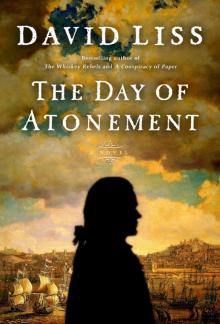 The Day of Atonement
The Day of Atonement The Devil's Company
The Devil's Company Randoms
Randoms Paleo / The Doomsday Prepper
Paleo / The Doomsday Prepper Rebels
Rebels A Spectacle of Corruption
A Spectacle of Corruption The Twelfth Enchantment
The Twelfth Enchantment The Coffee Trader
The Coffee Trader The Ethical Assassin
The Ethical Assassin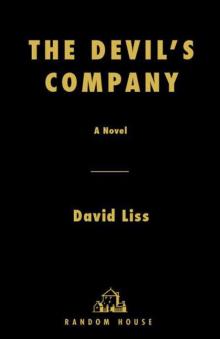 The Devil’s Company: A Novel
The Devil’s Company: A Novel The Double Dealer
The Double Dealer The Whiskey Rebel
The Whiskey Rebel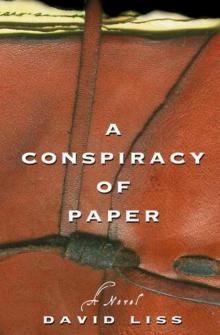 A Conspiracy of Paper bw-1
A Conspiracy of Paper bw-1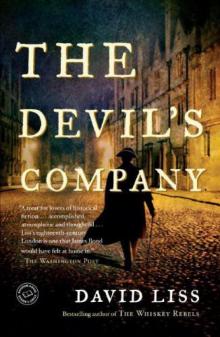 The Devil's Company bw-3
The Devil's Company bw-3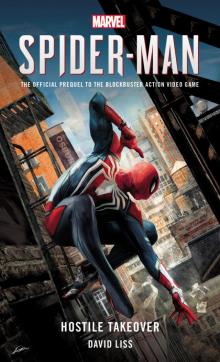 Marvel's SPIDER-MAN
Marvel's SPIDER-MAN